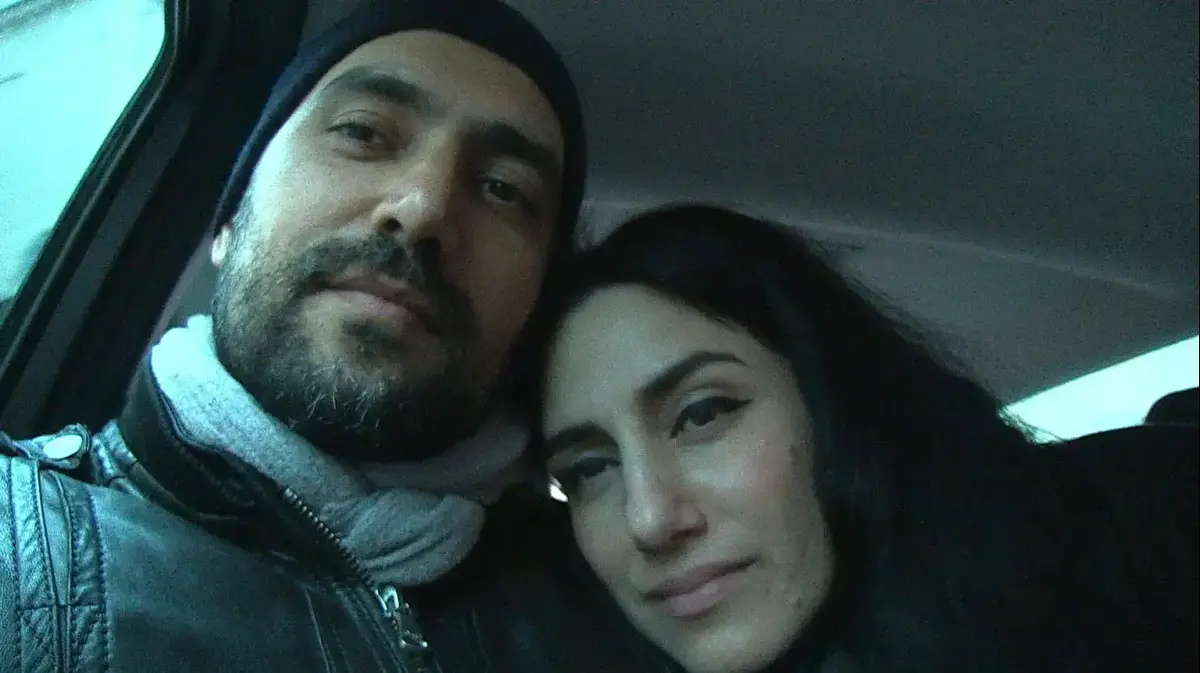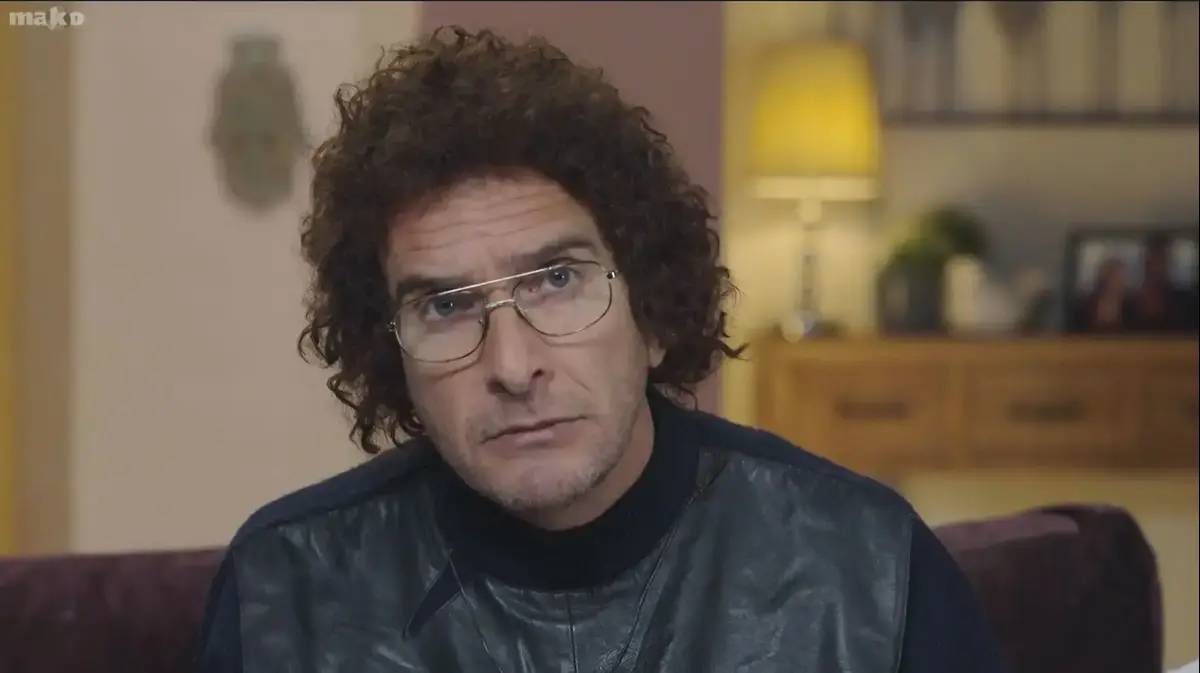Complete and unfinished
About half a decade after Ronit Alkabetz's death, her brother Shlomi Alkabetz presents "Black Notebooks," a unique art project based on her home photographs.
In a special interview, he talks about what was, what could have been and what will never be again
Avner Shavit
12/12/2021
Sunday, December 12, 2021, 00:00
Share on Facebook
Share on WhatsApp
Share on Twitter
Share on Email
Share on general
Comments
Comments
Shlomi Alkabetz has countless memories of his late sister Ronit. In the first of them, he was three years old. "We stood together on the balcony and looked at the street. I was cut from the bars, and tons of blood began to fall on me. To this day, I have a scar left of it," he says in an interview with Walla! culture. "Ronit quickly ran to the kitchen to get a rag, and wiped the blood from my leg. She is very present in that memory, and so in every other memory. In every memory I have of Maronit, she is very much in it."
Ronit Alkabetz was born in 1964, and Shlomi Alkabetz was born about eight years later. "She and Yechiel, my big brother, really wanted a little brother," he says. "When I was born, it was an event for them. I was their baby, kind of a keychain. They were very much looking forward to me, and I became the little toy of the two of them."
From Ronit's toy, Shlomi became her twin soul, her inseparable partner, and the two connected to another creative entity, one of the most influential in the history of Israeli cinema.
Together they were responsible for the important trilogy of his day, which began with "And Take a Wife for You," continued with "Seven," and ended with "Divorce" in 2013.
Alkabetz was already ill at the time of his filming, and died three years later.
In these three films, Alkabetz played the character of Vivian Amsalem, an Oriental woman who rebels against the patriarchy of her family, society as a whole and the rabbinical establishment.
The story drew from the autobiography of her family and her little brother, and was personal but also universal - Ronit became an icon for everything in France.
When she came to the Cannes Film Festival, year after year, she was always treated with the respect of royalty.
"I was her baby, kind of a keychain."
From "Black Notebooks" (Photo: Cannes Film Festival)
Five years after the death of his older sister, Alkabetz returned to Cannes last summer with a project she focuses on, based mostly on home videos shot in real time. On the Riviera we screened this project in sequence; Here 11 will present it in the coming months as a series of five episodes; And in our movie theaters it will be screened in two parts. The first part, "Black Notebooks - Vivian" came up this past weekend, carried on a wave of rave reviews. The second part, "Black Notebooks - Ronit", will be released next month.
It is tempting to call this work a documentary, but it is more than that. One has to see to understand, or rather in this case - to feel. Nor can it be said that the chapters of "Black Notebooks" deal only with Baronit Alkabetz and her. This epic project talks about much more than that. About a woman and a family, about the joy of life and death, about reality and art, about memories and dreams, about Israel and France, and this is only a partial list.
The film presents a combination of thought and poetry.
So does Alkabetz when he talks about it, and I tried to maintain his unique style in the transcript of his remarks.
"The idea was to make a film that I did not shoot," he says in an interview that takes place in Zoom ahead of the release of "Black Notebooks - Vivian".
"I did not shoot the film as you saw it. I shot relatively simple moments of life, and many of them were repeated. I have six hundred hours of raw material, and of all the characters I shot and did not want me to immortalize, I could put together another whole film. Most of the moments I shot were not "Dramatic in itself. If there was a drama, I felt uncomfortable and took down the camera. I do not pick up the camera for the drama. I have always picked it up to watch."
Thought and Poetry.
From "Black Notebooks" (Photo: Cannes Film Festival)
"When I started with the project, it was clear that context needed to be sought, and that could only be done in the editing room, with Joel Alexis, who was Ronit and Shelly's regular partner. The first step was to write a thirty-page script describing what I would like to see happen in the film. I came to Joel with it and asked her to flip through the raw materials as well and tell me what she thinks. We started putting the puzzle together and came out a worthy film, but not a film I felt I should do. "A film came out that corresponded with the content and themes that were already in our plot trilogy. I did not find it useful, and I decided to shelve the film in its original form."
Then what happened?
"Joel and I would talk a lot. We sometimes sat for hours in the editing room before we put a picture to a picture, and out of that discourse came an interesting idea. The idea was that I would not refer to the archive as my private past, but as the present of the characters in it. Theirs, and does so with some attempt to change fate. "
Do you believe in fate?
"Even in Jewish mysticism, when we talk about destiny, the belief is that authority is given. I refer to it in the film. We are born into something, but authority is given, and I take that authority. He who believes in fate believes he can change his destiny. It is not that I thought one morning "Akum and Ronit will be waiting for me in the living room, but everything you do, from the fact that you do it, changes something. The very fact that we have the conversation between us is to change fate."
"I was enchanted when I made the film. In my opinion, you can watch it and not think about anything. You move within some inner stream of consciousness that works with the simplest tools of cinema. You can see the film and just feel and feel."
"At first I shelved the film."
From "Black Notebooks" (Photo: courtesy of United King Films)
The film also includes excerpts from Ronit's diary, which Shlomi reads aloud. "This decision was very easy for me. If I want to hear Ronit's diaries, I have to read them myself," he explains. "At one point, before I closed the film, I tried and tested what it meant to bring an actress to read them in Ronit's voice. Ronit herself had never read them in her voice, so if I had brought an actress to do so in her name, it would have broken and shattered the whole way the film blurs between The present and the future. "
If you could ask Ronit one question today, what would you ask?
"What would I ask? I would tell her 'come see'. I'm not one of those people who talks to the dead. It's not a documentary about Ronit. Of a character facing time, facing nature, facing death.In a completely theoretical game, I would give her the script and ask - 'Do you like this role? '"
What is the most exciting thing you experienced on the journey with the film?
"Discovering the film in the editing room. Those were five years where I kept getting excited. Then, even before the film's premiere in Cannes, I did some previews and the reactions were very powerful. Regarding the screening in Cannes: Ronit is the star of the film, but so is our mother. His star. There was a moment right after the premiere in Cannes, that my mother stood up and applauded her, and then she joined hands and said thank you in her body. In that moment, it was not just a mother saying thank you to her son, it was my character who thanked me for the way "I told her, about how I described her. It was a very powerful moment, which I had not experienced before."
"It wasn't just a mother saying thank you to her son. It was my character thanking me for the way I told her."
From "Black Notebooks" (Photo: courtesy of United King Films)
Separately from Maronit, Alkabetz directed the acclaimed documentary "Testimony" and produced, among other things, the acclaimed "Not Here, Not There". Since "Divorce" he has not made a feature film and he focuses on production, teaching and acting - for example in the series "The Boys".
His and Ronit's love for cinema developed at the same time, when he was a teenager and she was in her early twenties. "We had an unsigned deal, that we would do things together," he says. "Despite the age differences, we were at the exact same point of view, both in life, also in art, also in ourselves, also in gender. We started living together and had a good time like that, as a creator, as a brother and sister, as a friend and as a friend, we felt exhausted within "This connection. Art gave us an opportunity to get even closer to the connection that already existed. Cinema paved our way to each other and together out."
Ronit loved France and France loved her. Her Israeli films were praised there, and she also starred in several French films.Where did this love come from?
"I remember going with Ronit to Tel Aviv and she told me 'I have to get out of here.' We already knew I was going to go to New York, and she told me that regardless, she had to go too. highs reached in Israeli cinema, she would not have reached without experience in France "
" We come from a Moroccan. French is the language we know. when I walk down the street and hear French, I feel like I found my childhood and in the conversations of my parents. Paris, when I'm at the grocery store and hear someone outlet His North African, I hear my grandfather's accent. Ronit also had that deep connection, and to that she added her attraction to French cinema and theater. It was not easy for her in France. She had to go through butts, but there was an opening in the door. "That she could go through it. That's of course just my perspective. It's a shame she's not here to give her version."
"Our parents came to Israel as immigrants, and immigration is genetic, it stays in the blood. In our films, we see that we adopted the identity of the immigrant and the immigrant, and we continued this journey."
From the movie "Black Notebooks" (Cannes Film Festival)
Today, Alkabetz is already a consensus in the Israeli auditing world.
Also because some critics who were senior in its infancy are no longer active nowadays, also because other critics have suddenly changed their minds.
In real time, the critical response to "take you a wife" was mixed.
In France they praised him.
In Israel, after its premiere at the Jerusalem Festival, the veteran guard infuriated him, and "black notebooks" also express this.
"It's not a personal matter. It's a matter of time. Before 'Take a Wife' came out, you could not find in Israeli cinema a reliable, loyal and sensitive representation of the life of an Oriental woman. You did not find, because there were no Oriental directors and certainly not Oriental directors, and it is not That today there are a million, "he says.
"Even when there was representation for Mizrahi women, it was in a very specific form. They were portrayed out of the eyes of white cultural hegemony. Mizrahi woman was a battered woman or pregnant woman. There were no films about Mizrahi bourgeoisie, Mizrahi rebel. For critics, Jean Dark was "She must be white, she could not be Moroccan. An Oriental woman could not redefine the concept of freedom."
"Interesting to note: when the film came out, its opening scene was praised, but as soon as the Oriental woman opened her mouth - it became a horror film for the critics. What was the horror for them? The Oriental woman's mouth opening. "It was a classic. When she opened her mouth, it was a problem. It's a matter of perceptions."
"The film is an important moment in the history of Israeli cinema, because the Mizrahi woman regained control of her story, and told it as she knew it and as she knew it. What bothered Ronit was not the film criticism. As you know, I will never comment on her artistic judgment "It bothered her that critics criticized the film's authenticity, even though they did not have the tools to do so."
"We got a lot of fire over the years, and obviously Ronit was hurt. Obviously it moved her a bit, she was human. On top of all that, she knew what she was bringing into the world. She understood what her role was and tried to fulfill it. She was more of an actress. Acting and cinema were a box. The resonance she chose to use, and I think she fulfilled her vocation completely, and she knew it. "
"When the film came out, its opening scene was praised, but as soon as the Oriental woman opened her mouth - it became a horror film for critics." From "Black Notebooks" (Photo: courtesy of United King Films)
When a talent died, Uri Klein wrote: "His beautiful article 'The Face of Garbo', concludes Roland Barthes in comparison between Greta Garbo and Audrey Hepburn in which he states that Garbo's face is an idea, those of Hepburn - an event. And what was Ronit Alkabetz's face in a dichotomy "In my opinion, both an idea and an event. The event is over. The idea continues."
My question to you, Shlomi, is - what was this idea and how did it last?
"Ronit's face really was an event. She was able to reflect through her gaze the time she lived in it completely. There was something transparent in her presence that allowed you to see everything that went through her. She was able to defy almost anything and thus created the ultimate tool. "Of art - the critique. And where does it happen? Not with Ronit herself, but with us, when we look at it."
What would Israeli cinema have looked like if Ronit had survived and continued to act in it?
"This is a question I deal with a lot. I miss her presence very much, not necessarily as a brother but also as a filmmaker. After all, she also made films with other directors besides me, and it is always interesting to see the films they made with and without her, before and after her death."
"Ronit had the ability to tell the body, the voice, the history, the sex, the color, the geography. I think today you have to unite many different voices to tell the story that Ronit was able to tell in one go. This is the way of the world. She left. "It's too early. I would love to see her in new films and see where she takes Israeli cinema, but the disappearance of one huge voice also leaves room for others and others to grow and flourish."
"Her face really was an event."
From "Black Notebooks" (Photo: courtesy of United King Films)
Does the younger generation know Ronit?
"When I was a teenager, I was immediately exposed to a cinema made sixty-seventy years later. Today, what exists is only what exists now. I volunteer at the 'See Far' organization, which educates teenagers in the periphery. Most of them do not know who I am and do not know who Ronit is. "Hopefully Black Notebooks will reopen this book. I think the editing of the film corresponds with the way images are consumed today."
Where is Vivian Amsalem today?
"Ronit and I had plans for her. We wanted to let her grow up, see what happens to her and her daughter. Where is she today? She appears in 'Black Mirrors.' She became an actress, and plays the woman who gave her life, Ronit. "To her once, and if so - how. Maybe I will not return. It is possible that this character said what she should have said."
"Ronit and I were a creative entity. Our films, what you see on the screen, are the result of our dialogue; of the spoken and the unspoken; of our being, dreams, fears, angers and loves, and the way they merged. You will never see new films of this entity "This episode is over. We made a movie seven years ago, 'Get It,' and it was our last movie."
culture
Theater
Cinema News
Tags
Ronit Alkabetz
Shlomi Alkabetz















